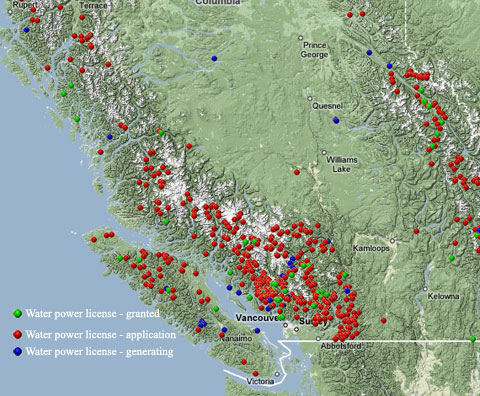
|
February 5, 2014 |
Vol. 2 No. 1 |
|
No to the Hydro Rate Hikes! Nation-Wrecking to Pay the Rich No to the
Hydro Rate
Hikes! No to the Hydro Rate Hikes! Nation-Wrecking to Pay the RichBC Liberal Energy Minister Bill Bennett and BC Hydro CEO
Charles Reid announced last November a five-year compounded 28 per cent
mill rate increase for electricity, with the first 9 per cent increase
coming into effect on April 1 this year. The dictated rise the people
and businesses must pay will total 45 per cent over the next 10 years The electricity rate increase is due fundamentally to the Liberal government pay-the-rich privatization scheme launched in 2002 with its Energy for Our future: A Plan for BC. The plan prevents the public enterprise BC Hydro from developing any new power projects, with the exception of Site C on the Peace River. Privatization has forced BC Hydro to purchase expensive power produced by private capitalists, the Independent Power Producers (IPPs).
The BC Liberal regime has compelled BC Hydro to purchase privately-produced electricity through long-term contracts at rates up to $124 per Megawatt Hour (MWh). This price is absurdly higher than the BC Hydro price of production of $5 to $6 per MWh at its major river facilities on the Peace and Columbia. During the last decade while the government was privatizing public power with its $124 MWh IPP contracts, BC Hydro's rate for major industrial consumers (mines and pulp mills) has been about $40 MWh. The state-organized IPP private contracts to provide electricity not only represent an enormous loss of income for the public treasury but also a new burden on the people and businesses that now face the higher rates. The transfer of value and money from the public and businesses to specific owners of IPP capital is substantial. The 2013 BC Hydro Annual Report records $52.4 billion in future contractual commitments, of which some $51 billion are for long-term purchases of high-priced power from the private investors. The impact of privatization on rates is now seen in the Liberal government's announcement dictating 10 years of dramatic increases in the market price for electricity. Let us unite to stop this nation-wrecking to pay the rich. No
to the Hydro Rate Hikes!
Liberal Government Cover-UpBill Bennett, BC Minister of Energy is attempting to rationalize his November 26 announcement of a "10-year plan" to increase BC Hydro rates a compounded 45 per cent. The new rate increases on top of what already has been an alarming jump in 2013, begin at 9 per cent in April 2014, another 6 per cent in 2015 and thereafter averaging 2 to 3 per cent a year to 2024. This irresponsible move will impose an enormous burden on all individuals and economic sectors, weighing heaviest on lower paid workers and others on fixed incomes and on social programs such as education and health care.
Using one proposed number from a government agency to obscure and soften the actual number is not credible and explains nothing. Secondly, Bennett says BC Hydro facilities need upgrading, and new power produced today cannot be compared with the evaluations for power produced using installations built in the 1960s. With newer and better technique and higher productivity, the power produced today should be at a lower evaluation than power produced with technique and facilities over a half a century old. His second excuse is likewise not credible and explains nothing. Besides, the Liberal government in 2002 ordered BC Hydro to stop building any new facilities using modern technique and advanced productivity. The real reason for the rate increases is privatization and a neo-liberal drive to gouge the people and their social and economic institutions on behalf of privileged private interests. It is neo-liberal wrecking of BC Hydro and what the people built in the province over decades. The increased rates are a direct result of Liberal government policies and practices since 2002, all of which profit private investors mainly so-called Independent Power Producers (IPPs) and companies such as Fortis Inc. that control BC Hydro accounts and billing. In 2002, the Liberal Party in power announced BC's new Energy Plan. The cornerstone of that plan was and remains nation-wrecking to serve the narrow private interests of certain investors over the public interests. The Liberal Party forbid BC Hydro from building new sources of public energy, except for the possible "Site C" dam and power facilities on the Peace River. The Liberal government ordered all new power projects to be privately built and financed with the new power contracted to BC Hydro at high guaranteed rates on a "take or pay" basis, which means BC Hydro must take the power whether it needs it or not or pay for it anyway. Privatization of BC HydroPrivatization of BC Hydro has dramatically changed the way the produced value is distributed. Before privatization, the produced value when realized was claimed by the public enterprise for reinvestment, claimed by the government as taxes and a annual sizeable remittance, and passed on to buyers of electricity in rates that were the lowest in North America. A portion of the produced value was claimed by moneylenders at interest rates reflecting the low level of risk. After privatization of parts of BC Hydro, the produced value when realized is claimed by the owners of private equity, mainly the IPPs but also monopolies such as Fortis Inc; some value is still claimed by the public enterprise and governments but buyers of electricity are facing higher and higher rates. A portion of the produced value connected with the IPPs is claimed by moneylenders at interest rates reflecting those paid by non-government enterprises. Also, the amount of value for reinvestment in BC Hydro is less, requiring additional borrowing. Bennett's cover-up of the real reasons behind the rate increases ignores the reality of privatization and the seizure of produced value by private interests and the great harm this has done to BC Hydro and the public interest. The neo-liberal government is forcing the people and businesses of the province to pay higher rates for electricity. This is a transfer of wealth to private monopoly interests. Bennett's excuses for this retrogression are nothing but a crude cover-up of the reality.
Privatization Is a Retrogressive ScamRight from the beginning, the government's actions to create Independent Power Producers (IPPs) has been a fraud to serve private interests at the expense of the public interest.
The Liberal Party in power, through BC Hydro, gave the privately-owned IPPs guaranteed contracts to supply power to BC Hydro at inflated rates whether it was needed or not. The government also provided the IPPs information gathered at public expense detailing those BC rivers where power production during run-off is considered feasible. Whether those projects were sustainable in the economic sense or damaging to the natural environment was not considered by the studies. The owners of the IPPs took their guaranteed government contracts at inflated rates to financial institutions to acquire credit to build the projects. The banks were happy to lend money as the IPPs have state guaranteed contracts. As well, the interest rates demanded were higher than what the banks and other lenders could receive from direct public enterprises such as BC Hydro or the government. Compare IPP-Guaranteed Inflated Power Rate with Average Market RatesThe guaranteed inflated rate the Liberal government gave the IPPs is $124 MWh. BC Hydro sells power to the major industrial customers at $40 MWh. Buying IPP power for $124 MWh and selling it for $40 MWh can hardly be called sustainable. The difference is a direct subsidy to private interests that is totally wasteful and retrogressive. Also, most of the IPP contracts were signed at a time the government and BC Hydro knew Columbia River hub prices, where surplus BC electricity is often sold, were fluctuating as follows: "Index Annual Average of Daily Bilateral Day Ahead On-Peak Prices: ICE California-Oregon Border (COB) Hub: $51.68/MWh (2006), 59.86/MWh (2007), 73.42/MWh (2008), 35.40/MWh (2009) ICE Mid-Columbia (Mid-C) Hub Index $47.98/MWh (2006), 53.59/MWh (2007), 64.48/MWh (2008), 35.25/MWh (2009)"[1] Apart from the inflated guaranteed price, the IPP "run-of-river" scheme is ill-suited to BC electricity needs. The maximum production of IPP electricity occurs during the spring-summer run-off, precisely when the major BC Hydro dams are full of water and the entire northwest of the U.S. is awash in electricity. Export prices are low. During the 2013 spring-summer run-off, the major BC Hydro dams were spilling "surplus water" over dam tops because government had committed BC Hydro to use the high-priced privately produced IPP electricity. When the guaranteed inflated contracts end in 15 to 25 years from now, all the IPP facilities will become the private property of the monopolies that have purchased them. These include global giants such as General Electric and Siemens, which have purchased them from the initial IPP investors. In this way, the global monopolies have extended their control over BC's economy, which is reflected in their control of the government and state machine. The time is now to organize for the people's empowerment
and to step up resistance against neo-liberal retrogression and fight
for a new direction for
the economy to serve the public interest. Note 1. http://www.ferc.gov/market-oversight/mkt-electric/northwest/elec-nw-reg-des.pdf
Government and Public Agencies in
|
 Map of Red Chris copper/gold development -- click to enlarge. |
To supply the private Red Chris mine, the public enterprise BC Hydro is building a $1-billion transmission line with public funds that are mostly borrowed. The power carried on the transmission line will be supplied by private IPP producers and bought by BC Hydro at the guaranteed inflated rate of around $124 MWh. After carrying the power to the Red Cross mine on the billion dollar public transmission line, the private mine owners will purchase the power at a BC industrial rate of about one-third the amount paid by BC Hydro.
This arrangement means the public treasury is subsidizing private industry and increasing the public debt in doing so. The arrangement solidifies class privilege and the stranglehold of private interests over the BC economy, including the land and resources that are owned essentially by First Nations and the people. This arrangement is completely wrong and against the public interests. The land, resources and economy should be used for the betterment and well-being of all not a privileged few.
Site C Dam and Power Facility
The use of public funds and infrastructure to enrich private interests is also being played out in BC's northeast. The government has directed BC Hydro to build a Site C dam and power facility on the Peace River. The $8-billion infrastructure project is meant to provide electrical power to the private projects of Encana and other energy monopolies in the gas fields of the northeast. The method for gas extraction called fracking requires electricity and water.
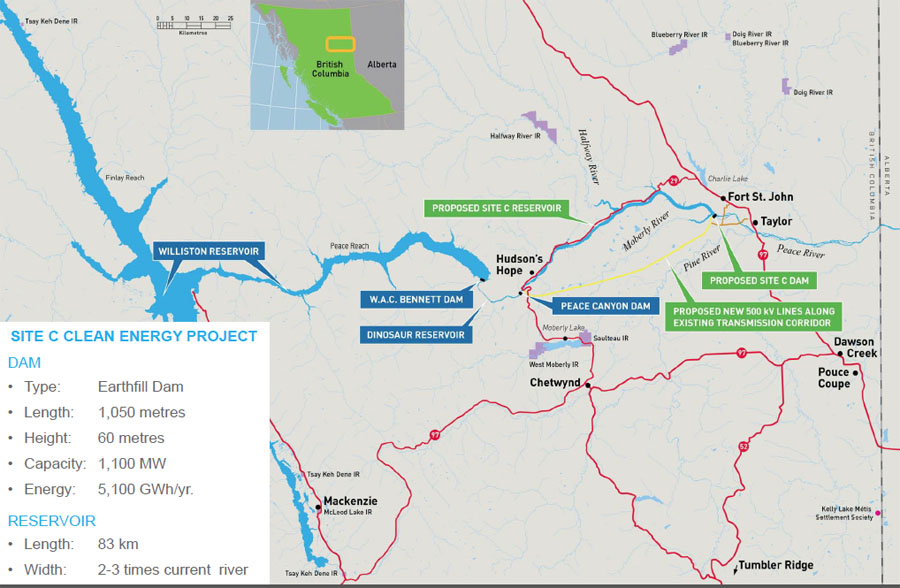 Map of Site C dam -- click to enlarge. |
The public's natural resource seized by private interests using public infrastructure will then be sent through pipelines to the west coast and turned into liquefied natural gas for shipping to Asia and the U.S. The transformation to LNG needs even greater amounts of electricity.
People should grasp how the resources of the province are being plundered for private interests using public resources with the active connivance of government representatives. The higher electricity rates everyone will pay with the government's 10-year plan of rate increases are meant to subsidize the private profits of the IPPs and those mining monopolies ripping and shipping raw materials out of BC. The people are subsidizing the drive of the rich to become richer and to consolidate their class privilege and power. This is not a human-centred way to develop the province. The economy needs a new direction that serves the people and guarantees their well-being and security.
Liberal Drive to Privatize Power Production
Threatens
Canadian Control of Water
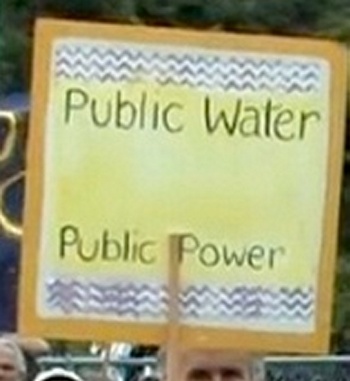 The Liberal government
practice of privatizing BC rivers
is a threat to the sovereignty of British Columbia and Canada. By
virtue
of private monopoly
control over hundreds of rivers and streams to produce spring run-off
electricity at exorbitant state-guaranteed prices, the monopolies are
in a strategic position
to capture the water for export.
The Liberal government
practice of privatizing BC rivers
is a threat to the sovereignty of British Columbia and Canada. By
virtue
of private monopoly
control over hundreds of rivers and streams to produce spring run-off
electricity at exorbitant state-guaranteed prices, the monopolies are
in a strategic position
to capture the water for export.
The southwest of the United States, including West Texas on the border with New Mexico is using up its ground water reserves. California Governor Jerry Brown declared a drought emergency on January 17 to seek federal aid to deal with the damaging symptoms of a problem long in the making.
The paper The Last Drop: Climate Change and the Southwest Water Crisis explains: "In the U.S. Southwest -- Arizona, California, Nevada, New Mexico, and Utah -- there is less rain and snowfall each year than the amount of water used in the region. Today that shortfall is made up for by pumping groundwater, well beyond the sustainable rate."[1]
A growing body of research suggests the assault on the southwest water table, in addition to the practices of monopoly-controlled agriculture in California, is escalating with the use of water and chemicals for fracking in the present west Texas oil boom in the Permian Basin and elsewhere. A typical fracking well operation to release the oil or gas consumes 5 million gallons (U.S.) (about 1,892.5 m. litres) of water, with some seeping back underground in a contaminated form. Apache Corp. operates the only well in the Permian Basin with a completely recycled process using both inflow brackish water drawn beneath the freshwater aquifer and outflow waste water. At present, every other operation trucks in fresh water for fracking.
Despite the possibilities of oil monopolies and their drilling contractors using recycling technology, the reality of the 2011 seven-month drought in West Texas recalls the "Dust Bowl" in the 1930s. The 2011 drought was the 7th in 13 years.
The water crisis in the entire southwest is caused in part from agricultural methods to grow wheat, corn and other crops intensively in arid areas. Irrigation water is drawn from aquifers, much of which evaporates or is absorbed into the crops and removed, setting up the region for a long-term water shortage. Capitalist anarchy of production seeking maximum return at the fastest speed without concern for consequences to the social and natural environment is leading to a "thirsty monster" in the southwest USA stalking North America for freshwater.
BC is regarded as a region with "surplus precipitation and water run-off." The North American Water and Power Alliance (NAWAPA) conceived by the U.S. Army Engineer Corp in the 1950s and widely promoted among political circles in both the USA and Canada in the 1960s is an example of the arrogant reckless imperialist ambition the ruling circles have toward the social and natural environment and society. Among other mass displacement of peoples to satisfy its water and other demands, the militarist NAWAPA envisioned the complete removal of Prince George from the map!
Less grandiose than NAWAPA (which still has some promoters), but threatening nonetheless are plans to move fresh water by tanker from the BC coast to California or possibly through land-based pipelines. For example, if the wild salmon runs on the Fraser River system were exterminated, then that river could be dammed for both electricity and water export. Such a scheme was proposed in the 1950s but stopped by a then still strong fishing industry. The wild fishing industry has now been considerably weakened through loss of stock caused by many human-made factors including the proliferation of Atlantic salmon fish farms on wild salmon migration routes.
British Columbians should think about what the neo-liberal provincial government has created in the face of a thirsty giant in the southwest USA. The Liberal government has handed over control of hundreds of BC rivers to U.S. monopolies. They are producing run-off hydro-electricity, which BC Hydro is forced to purchase at high state-guaranteed long-term prices driving up local electrical bills. Under the guise of high prices for electricity and cries of austerity, the Liberal government could acquiesce to outright expropriation of the water in the rivers and begin exporting river water to the southwest USA as a pragmatic solution to BC's economic problems. This would be advertised as another "jobs plan" similar to Premier Clark's mania to export other raw material such as fracked natural gas and unprocessed wood.
Water, salmon, wood, oil, gas, coal, gold and other natural resources and the social and natural environment in which they are found are precious and the people have a social responsibility towards their well-being. The people cannot allow the monopolies and their government representatives to torture and destroy them with their short-term pragmatic neo-liberal schemes for private profit.
The people of BC have the responsibility to defend themselves and their social and natural environment from the ravages of monopoly right. The public interest must come first. This begins with organized resistance to monopoly right and its irresponsible plundering of BC's human and natural resources.
The problems of a drought-stricken U.S. southwest cannot and should not be solved with yet more reckless schemes of the private monopolies. The people cannot allow the ruling elite and private monopolies to use their unwillingness and incapacity to build a self-reliant, independent, crisis-free and socially responsible economy as an excuse to plunder and wreck even further the social and natural environment. Let's unite and organize to resist and defeat the schemes of monopoly right and its anti-social political power.
Note
1. The paper is available at http://sei-us.org/Publications_PDF/SEI-WesternWater-0211.pdf
Read BC Worker
Website: www.cpcml.ca
Email: office@cpcml.ca
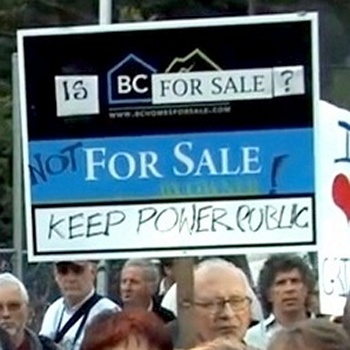 The motive of the IPPs in
producing power is to have the
highest possible rate of return on their investment in the shortest
time. This motive comes into
contradiction with the motive of the people to have electricity
produced to serve the public interest, the socialized economy and the
social and natural
environment. Putting the private motive of the IPPs in control of an
essential public sector of the economy, which touches the well-being of
all residents
and businesses, has resulted in extremely questionable "run-of-river"
projects on BC's rivers and rapidly increasing market prices for
electricity.
The motive of the IPPs in
producing power is to have the
highest possible rate of return on their investment in the shortest
time. This motive comes into
contradiction with the motive of the people to have electricity
produced to serve the public interest, the socialized economy and the
social and natural
environment. Putting the private motive of the IPPs in control of an
essential public sector of the economy, which touches the well-being of
all residents
and businesses, has resulted in extremely questionable "run-of-river"
projects on BC's rivers and rapidly increasing market prices for
electricity.
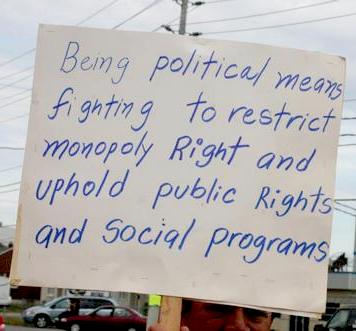 First, Bennett excuses his
increase as being lower than
the one formulated in an August 11 BC Hydro Rates Working Group paper
leaked by the
Canadian Office and Professional Employees Union, Local 378. The
proposed hike was for 26.4 per cent over 2014-15.
First, Bennett excuses his
increase as being lower than
the one formulated in an August 11 BC Hydro Rates Working Group paper
leaked by the
Canadian Office and Professional Employees Union, Local 378. The
proposed hike was for 26.4 per cent over 2014-15.